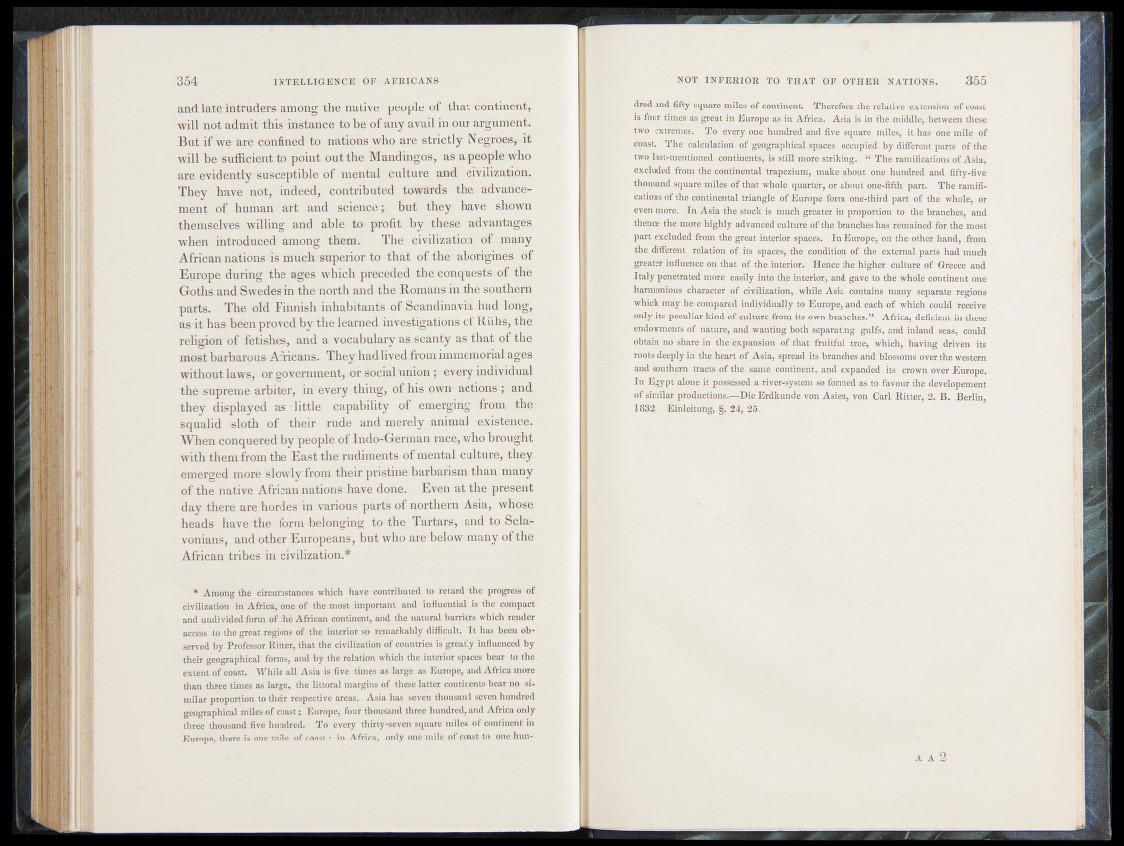
and late intruders among the native people of that continent^
will not admit this instance to be of any avail in our argument.
But if we are confined to nations who are strictly Negroes,;it
will be sufficient to point out the Mandingos, as a people who
are evidently susceptible of mental culture and civilization.
They have not, indeed, contributed towards the advancement
of human art and science j but they have shown
themselves willing and able to profit by these' advantages
when introduced^ among them. The civilization of „many
African nations is much superior to that of the aborigines of
Europe during the ages which preceded the conquests- of the
Goths and Swedes in the north and the Romans in the southern
parts. The old Finnish inhabitants of Scandinavia had long,
as it has been proved by the learned investigations of Rubs, thfe
religion of fetishes, and a vocabulary as scanty as that of the
most barbarous Africans. They had lived from immemorial ages
without laws, or government, or social union; every individual
the supreme arbiter, in every thing, 6f his own actions ; : and
they displayed asr-little capability of emerging from .thfe'
squalid sloth of their rude and merely animal existence.
When conquered by people o f Indo-German race, who brought
with them from the East the rudiments of mental culture, they
emerged more slowly from their pristine barbarism than many
of the native African nations^ have done. Even at the present
day there are hordes in various parts of northern Asia, whose
heads have the .form belonging todhe Tartars,' and to Scla-
vonians, and other Europeans, but who ardbelow many of the
African tribes in civilization.*
* Among the circumstances which have-contributed to retard the progress of-
civilization in Africa, one of the most important and influential is the compact
and undivided form of thé African continent, and the natural barriers which render
access to the great regions of the' interior so remarkably difficult. It has been observed
by Professor Ritter, that the civilization of countries is greatly influenced by
their geographical forms, and by the relation which the interior spaces bear to the
extent of coast. While all Asia is five times as large as Europe, and Africa more
than three times as large, the littoral margins of these latter continents bear no similar
proportion to their respéctive areas. Asia has seven thousand seven hundred
geographical miles of coast; Europe, four thousand three hundred, and Africa only
three thousand five hundred. To every thirty-seven square miles of continent in
Europe, there is one mile of coast : in Africa, only one mile of coast to onefrundied
and fifty square miles of cpntinent Therefore the relative extension of coast
is four times as great in Europe as in Africa. Asia is in the middle, between these
two'extremes. To every" 04e, hundred and five square miles,’ it has one mile of
coast. The calculation of geographical spaces occupied by different parts of the
two last-mentioned' continents, is'Still more striking, « The ramifications of Asia,
excluded from the continental trapezium, make about one hundred and fifty-five
thousand square miles of that whole quarter, or about one-fifth part. The ramifications
of the continental triangle óf Europe form one-third part of the whole, or
even more. In Asia the stock is much greater in proportion to the branches, and
thencq the more highly advanced culture of the branches has remained for the most
part excluded from the great interior spaces. In Europe, on the other hand, from
the different relation of its spaces, the cortó^tJon of the external parts had much
greater influence on that of the interior. Hënce the higher culture of Greece and
Italy penetrated more easily into the interiorj and gave to the whole continent one
harmonious character of civilization,, while Asia contains niany separate regions
which may be compared individually to Europe, and. each'of which could receive
only its peculiar kind of cuj^ure’from its own branches. ’^«Africa, deficient in these
endowments of nature, and wanting both separating gulfs, and inland seas, could
obtain no share'in the expansion of that fruitful tree, which, having driven its
roots deeply in the heart of Asia, spread its branches and blossoms over the western
and southern tracts of the same continent, and expanded its,, crown over Europe.
In Egypt alone it possessed a river-system só formed as jtojavbur the developement
of similar“productions!—Die Erdkunde von Asien, von GarT Ritter, 2, B. Berlin,
1832. Einleitung, §. 24, 25.
A A O